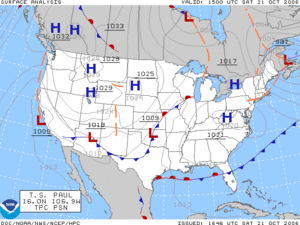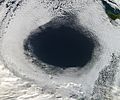High pressure area facts for kids
A high pressure area is a part of the Earth's atmosphere where the air pressure is higher than the areas around it. You can think of it like a big bubble of heavy air pushing down.
In the Northern Hemisphere, winds in a high pressure area move outwards and turn to the right (clockwise). In the Southern Hemisphere, they also move outwards but turn to the left (counter-clockwise). These areas are also called anticyclones.

High pressure areas usually bring clear skies and cooler, drier air. This is because the air in these areas slowly sinks, which stops clouds from forming. A special type of high pressure area, called the subtropical ridge, helps guide tropical waves and tropical cyclones (like hurricanes) across the ocean. It also helps create many of the world's deserts.
On weather maps, you'll often see a big letter "H" to show a high pressure center. In some countries, like Spain, they use the letter "A" for "alta," which means "high."
How High Pressure Forms

High pressure systems form when air slowly sinks from high up in the atmosphere down towards the ground. As this air sinks, it warms up and dries out, which is why we often see clear, sunny weather with high pressure.
These systems often form in specific places in the upper atmosphere. On weather maps, you can see them where air currents are coming together. This "coming together" of air helps push the air downwards, creating the high pressure.
Remember, high pressure systems are also known as anticyclones. On weather maps, the "H" (or "A") is placed right in the middle of the area with the highest pressure.
What Weather Do Highs Bring?
High pressure systems are generally linked to good weather. This means:
- Clear skies with few or no clouds.
- Less chance of rain or storms.
- Often cooler temperatures, especially at night, because there are no clouds to trap heat.
- Calmer winds, though sometimes light breezes can still be present.
This is different from low pressure areas, which usually bring cloudy, stormy, and wet weather.
Related pages
Images for kids
 | Chris Smalls |
 | Fred Hampton |
 | Ralph Abernathy |



